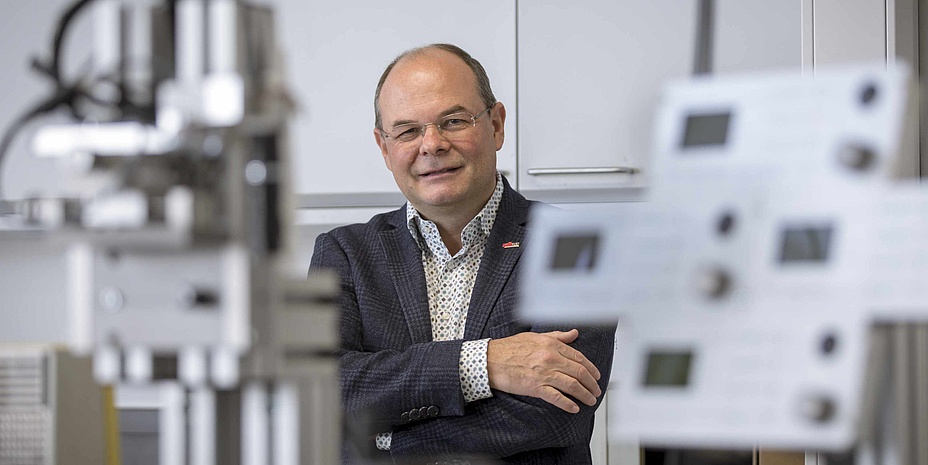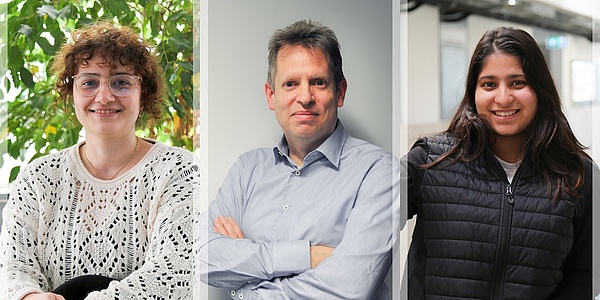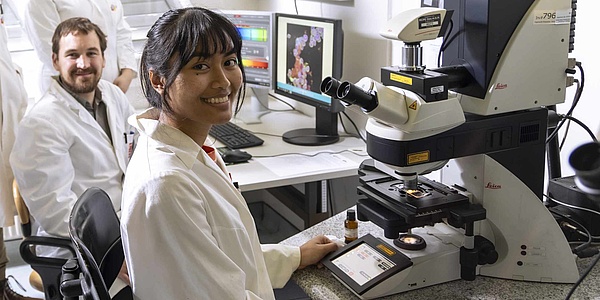ERC Grants: Welcome to the Champions League of Basic Research

They are regarded as a real accolade for researchers in basic research – the ERC Grants from the European Research Council. With ERC Starting Grants awarded to Theresa Rienmüller and Robert Winkler, TU Graz can now rejoice over a total of 19 ERC Grants.
They are highly competitive, highly respected and highly remunerated: the grants of the European Research Council (ERC), which are awarded exclusively on the basis of scientific quality. The ERC offers four central funding programmes for researchers at different career stages: Starting Grants, Consolidator Grants, Advanced Grants and Synergy Grants. With its additional programme for Proof of Concept Grants, the ERC helps grantees to bridge the gap between their ground-breaking research and the early stages of commercialisation.
TU Graz has up to now been awarded 19 ERC grants, which corresponds to a funding volume of 30 million euros. They comprise 12 ERC Starting Grants, three ERC Consolidator Grants, one Synergy Grant and three ERC Proof of Concept Grants – all which went to TU Graz researchers. ‘ERC Grants are among the most prestigious funding awards in Europe, and I congratulate Theresa Rienmüller and Robert Winkler on this great success,’ says Andrea Höglinger, Vice Rector for Research at TU Graz.
All ERC award winners at TU Graz at a glance.
Together with Stefan Freunberger, Thomas Pock was one of the first two researchers to receive an ERC grant at TU Graz in 2015. ‘The ERC Starting Grant was a decisive milestone in my career and enabled me to set up my own research group with a strong team.’ Today, Thomas Pock heads the Institute of Visual Computing at TU Graz. ‘At TU Graz, the grant has lent my voice more weight and made my work more visible. At the same time, it opened up international collaborations and gave me the freedom to pursue my research ideas consistently,’ summarises the researcher today.
Gerald Pichler from the F&T House has been supporting TU Graz researchers with ERC applications for years: ‘As a rule, it takes more than one attempt to win an ERC grant,’ he explains, adding that researchers should not be discouraged by negative feedback because: ‘The ERC Grants are the Champions League in basic research.’ Pichler therefore advises all interested parties to join the TU Graz ERC Club. In the ERC Club, grant holders and future grantees meet up twice a year to exchange ideas in an inviting atmosphere. Successful researchers openly share their stories and experiences on the way to successfully acquiring ERC grants. The next ERC Club meeting will take place on 24 November. If you are interested, please contact Gerald Pichler in advance (gerald.pichler@tugraz.at). For all ERC applicants who are also invited for an interview in the final evaluation phase, the F&T House offers individual ERC interview training in several rounds. They receive critical feedback and tips on their presentation from experienced evaluators, panel members and successful grant holders.
TU Graz scientist Gerhard Holzapfel has received numerous awards in his long career, and in December of last year he was awarded an ERC Synergy Grant: ‘The ERC Synergy Grant is probably the most highly endowed research prize currently awarded in Europe and is certainly a highlight of my academic career,’ stresses the researcher. ‘The grant gives me the opportunity to work with two leading scientists on a highly topical subject: determining the mechanical properties of living tissue. This is a unique opportunity to make biomechanical computer simulations more reliable and more widely applicable without having to constantly worry about funding.’ The European Research Council is funding the six-year research project to the sum of 10 million euros, around 4.2 million of which will go to the Institute of Biomechanics at TU Graz.
Applications for ERC grants can be submitted again in the coming months – you, too, should take your chance as a researcher because nothing ventured, nothing gained.
What do I need to consider when applying for an ERC grant? How does an application work? Gernot Müller-Putz answers these and other questions about a successful ERC application in an interview.
This article focuses on ERC grants at Graz University of Technology. In the TU Graz people cover story, you can read also the article ‘Believe in Your Ideas!’ and the article ‘From Application to Funding: Your Journey with the R&T House’.
You can find this article and other articles to browse through in TU Graz people #94, the magazine for TU Graz employees and interested parties.




